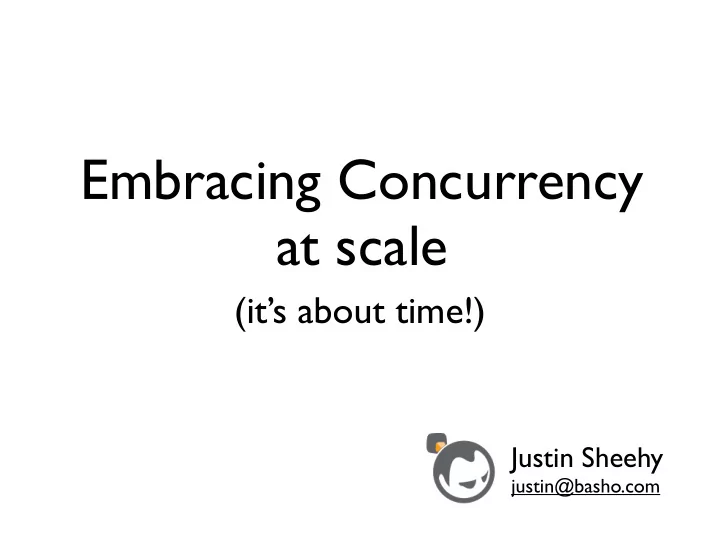

Embracing Concurrency at scale (it’s about time!) Justin Sheehy justin@basho.com
Concurrency Matters "The free lunch is over." - Herb Sutter, 2005
Concurrency Matters You got a free lunch!? "The free lunch is over." - Herb Sutter, 2005
New Problems, Old Solutions Distributed Systems matter now more than ever, and we must learn from the past to build the future.
Don't do what I say. (yet) Working at scale isn't just "more." It is different.
What is Concurrency? concurrent : occurring at the same time concurring : agreeing with others
Time is a Hard Problem Einstein, Minkowski, Schwarzschild...
Time in Computing Lamport, 1978 -- gave us “happened before” Mattern, 1989 -- closer to Minkowski causality
Time is a Hard Problem In computing, we like to pretend it’s easy. This is a trap!
Distributed Computing is Asynchronous Computing Synchrony (distributed transactions) throws away the biggest gains of being distributed!
Three Kinds of Computing - Pat Helland memories : at time T , I learned fact F guesses : based on my memories, I will try G apologies : G didn't work out, oops
There is no “Global State” You only know about the past -- deal with it! This sadly often means giving up on ACID. (globally, not locally) This is going to hurt!
tent lly-Consistent Atomicity Consistency Isolation Durability
tent lly-Consistent Atomicity Consistency Isolation Durability Basically Available
tent lly-Consistent Atomicity Consistency Isolation Durability Basically Available Soft State
tent lly-Consistent Atomicity Consistency Isolation Durability Basically Available Soft State Eventually-Consistent
tent lly-Consistent This is a real tradeoff -- if you make it, understand it! (Eric Brewer, 1997) Basically Available Soft State Eventually-Consistent
CAP tradeoffs Consistency Availability Partition-Tolerance You want all three, but you can’t have them all at once.
CAP tradeoffs Consistency Availability Partition-Tolerance Distributed Transactions (on any real network, this fails)
CAP tradeoffs Consistency Availability Partition-Tolerance Quorum Protocols & typical Distributed Databases (nodes outside the quorum fail)
CAP tradeoffs Consistency Availability Partition-Tolerance Sometimes allow stale data... ...but everything can keep going.
CAP tradeoffs Consistency Availability Partition-Tolerance This is where BASE leads us.
tent lly-Consistent This is a real tradeoff -- if you make it, understand it! Basically B Available A Soft State S Eventually-Consistent E
tent lly-Consistent Eventually-Consistent Eventually-Consistent doesn’t mean “not consistent”! It just forces you to remember that everything is probabilistic. It also doesn't mean slow. BASE and DIRT are not in conflict! Sometimes you go "eventual" in order to go fast.
RPC is a scaling antipattern. Treating remote communication like local function calls is a fundamentally bad abstraction. • Network can fail after call “succeeds”. • Data copying cost can be hard to predict. • Tricks you by working locally. (and then failing in a real dist sys) • Prevents awareness of swimlanes. (and thus causes cascading failure)
Protocols vs. APIs • Explicit understanding of boundaries. (trust boundaries, failure boundaries...) • Better re-use and composition. (unintuitive but true in the large) • Asynchronous reality, described accurately. (see Clojure or Erlang/OTP libraries)
Successful Protocols Kings of the Internet: DNS & HTTP B A What do they have in common? S E
The Web (the second most successful distributed system ever) • no global state (closest: DNS root & MIME) • well-defined caching for eventual consistency • idempotent operations! • loose coupling • links instead of global relations • no must-understands except HTTP
History of Scaling The Web HTTP HTTP HTTP HTTP HTTP App App App DB Eek! Help from "NoSQL"?
Linearly Scalable computers "I can add twice as much X to get twice as much Y." write-throughput! storage capacity! map/red power! 30
Measurement Today’s networked world is full of cascading implicit and explicit SLAs Reason about your behavior, but also measure it in production. 31
Measurement In dist. sys. if you don't measure everything, then you’ll pick the wrong bottlenecks. Measure your systems top to bottom, and correlate information cross-system. 32
Resilient Assume that failures will happen. At scale, they are ALWAYS happening. Designing whole systems and components with individual failures in mind is a plan for predictable success. 33
Know How You Degrade Plan it and understand it before your users do. You might prevent whole system failure if you’re lucky and good, but what happens during partial failure? 34
Know How You Degrade Plan it and understand it before your users do. You think you know which parts will break. 35
Know How You Degrade Plan it and understand it before your users do. You think you know which parts will break. You are wrong. 36
Harvest and Yield harvest : a fraction data available / complete data yield : a probability queries completed / q's requested in tension with each other: (harvest * yield) ~ constant goal: failures cause known linear reduction to one of these 37
Harvest and Yield traditional ACID demands 100% harvest but success of modern applications is often measured in yield plan ahead, know when you care! 38
Sometimes, you will fail. Plan it and understand it before your users do. If you think you can prevent failure, then you aren’t developing your ability to respond. - Paul Hammond Being able to recover quickly from failure is more important than having failures less often. - John Allspaw 39
Sometimes, you will fail. Plan it and understand it before your users do. Applications built for scale can make recovery either easier or harder. You get to choose. 40
two things to make it easier : minimal, async interfaces when possible locality of computation and reasoning 41
Embracing Concurrency at scale (it’s about time!) Justin Sheehy justin@basho.com
Recommend
More recommend